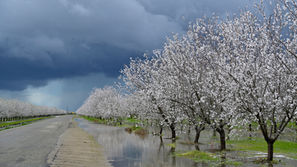City Manager talks cannabis sales
- Aug 20, 2022
- 6 min read
With the applications already submitted, and the city approved of it, cannabis sales may begin as early as November with eight retail establishments.
The Madera Tribune sat down with Madera City Manager Arnoldo Rodriguez to get educated on cannabis coming to Madera, and what that will mean to the city.
In addition to an influx of funds to the city, Rodriguez points out, it’s another way for the City of Madera to provide for their residents so they don’t have to go elsewhere.
“Any time we can keep sales tax dollars and provide a service, even if they disagree what the service is, it’s okay. All we can try to do is establish parameters around that,” he said.
Madera Tribune: Where are we in terms of cannabis in the city?
Arnoldo Rodriguez: The city is in the process of reviewing applications. When the city started this process approximately two years ago, we weren’t sure which path we were going to take. We had tremendous community outreach. The challenge was is that it was during COVID. It did go onto the ballot and the City of Madera voted to tax cannabis. We went back to the council and they allowed cannabis in the community.
We worked through details for locations and numbers. We went through the social implications for those decisions. The council elected to allow six retail store fronts and two retail store front with a social equity component to it. By that, the social equity component is the allow people that would not qualify or it would be very challenging to compete against big market players. We were trying to even the playing field for the small guy. When we started the process, it was a robust process in policy formation. There was a lot of community outreach and a lot of discussion. The council settled on the eight licenses. We have criteria for the social equity applicants.
MT: With a new industry, it was interesting that you had to come up with all of the legislations for cannabis.
AR: That’s one of the challenges. We’re getting into a rather new industry. Other cities have experience with cannabis and they are going through growing pains. The state of California is going through growing pains. There are some lessons learned from Colorado. We are not at the exact forefront, but we are pretty close. As we’re going through the process, it was always known to have unintended consequences. We’re treading very lightly. We had to put together an exorbitant amount of paperwork with this. Like, what happens when you have a bad operator. Oftentimes when you are writing these rules, you expect the good operators to follow them, but every once in a while, you get a bad operator. Unfortunately, bad apples are in the bunch. What we want to do is to get good operators from day one. I think we have an excellent policy framework in place. Now, we’re reviewing the applications. Hopefully, they will be brought in to the council in the fall and the council will have ultimate decision on the applicants.
MT: How many applications have you received?
AR: We received 28. All 28 are still in the running (as of the end of July). The city has not rejected a single applicant.
MT: What is the council looking in the applicants?
AR: The council has not seen any of the applications and I haven’t seen any of the applications. We want the process to be fair. We have an outside company that we have retained to review every application on our behalf. They are subject-matter experts in the state. They have done half of the cannabis licensing for different cities in the state. We have a retired city planner that we have retained that is serving on the city’s behalf. They will review all the applicants and score them. Once they feel they have gone through and evaluated them, they will make a recommendation to staff and send that to the council.
MT: Are you looking for good reputations, people that are community service minded?
AR: The council is looking for someone community-minded. They want to make sure there are some community benefits. There is a labor component, as well. They want to make sure certain positions are for Madera residents. In our situation, we are looking it from a revenue perspective. We know there’s a possibility to make a decent amount of revenue. The goal of that revenue is to go back into the community. The council has not decided how those dollars will be spent. The primary reason is we don’t know how much we are talking. Some cities have been successful and some not so successful. We think we have a good process. Our goal is to select the best operators. If it happens they generate a decent amount of funds for the city, it’s a win-win. If they don’t, it doesn’t make them bad operators. The other challenge we will have is the city to the south, Fresno, will have a lot of cannabis retail locations, too. We’ll be in direct competition with them. We want to be sure Maderans have the opportunity to buy local. We prefer people not to drive to Fresno for their purchases. The money that stays in Madera is used in Madera.
MT: Are there locations set for cannabis?
AR: We are very mindful in terms of where these retailers can be located. We have some parameters for public uses and schools. There are some distance requirements. We tried to do is look at where the schools are and proximity to that. There were some challenges to that. We also see this as a form to reinvest in our parks and community. We looked at distance requirements and exempt some parks. The goal is to lay the framework for the private market. It will dictate how development will go and where people will invest. Oftentimes, government tries to control that and do more harm than good. What we’re trying to do is to put the foundation there and get out of the way.
MT: When they submit an application for license, do they have to identify where they will go?
AR: One of the things they do have to do is identify where they will go. The application, itself, is 200 pages. It’s a very lengthy application.
MT: When they submit the application, do they have to submit a plan for their community service?
AR: They have to submit both, the kinds of structure for their company and what benefits they will provide. We didn’t articulate what they had to do. We allowed businesses do what they do best and let them articulate what they can do to help the community. They will tell us what they plan to do and weigh that against their competitors. We will have some scoring system.
MT: Is there any accountability to follow up on their plan?
AR: Every year, the licenses will have to renew with the city. This is an annual thing. The right to continue to operate is annual. If we have a bad operator, then the city just doesn’t have to renew their license. The goal is to identify good operators and let them be successful.
MT: Are you going to have a waiting list for operators that didn’t get approved?
AR: I’m not sure how we’re going to go about that. I’m sure over the next year, once we can get up and running, we’ll sit down with the businesses. They may say the city authorized too many licenses. The market is not large enough. Some may say having more competition is good for local businesses and the customer wins. There are others say they are doing so well, we could add more. It is too early to see how next year will play out. We think eight is a good number. We hope to have good successful businesses. If people want to buy product in Madera, hopefully they will.
MT: What do you tell people that say cannabis shouldn’t come to Madera?
AR: For a lot of people, it’s a moral or ethical issue. If you look at the history of the country, it’s something they’ve struggled with. I can’t judge who buys it. I just look at it from a public policy perspective. When it comes to public policy, not everyone is going to agree. We do know people in Madera use it for a litany of reasons. If someone wants to use cannabis for a number of reasons, who am I to say they shouldn’t. If they are going to buy it, and have to go to another city, that’s public policy.
MT: Applications are being reviewed. Is there a timeframe of when the licenses will be awarded?
AR: Right now, our schedule puts us in October. That is going to be dependent on how many appeals we receive from those no longer selected. Every step has an appeals component built into it. We’re in Phase 2. Every one that is not invited to continue to the next phase has the opportunity to appeal. We will have to exhaust those appeals before we move forward. The reason I say October, we have some appeals timelines built it, but you never know. If all goes well, sometime in October, the applications will go to council.
MT: Anything else about cannabis?
AR: We have different regulations for cultivations. We are allowing indoor and outdoor cultivations. There are challenges with indoor cultivations. There is a cultivation component. The regulations for it are reasonable and easier than other cities. The permits are easier to attain, but we have stringent requirements once you acquire it. We are open for business, but we want high-caliber businesses to come into our community.





















Comments